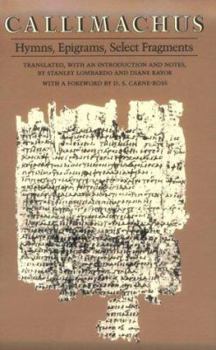Callimachus: Hymns, Epigrams, Select Fragments
Select Format
Select Condition 
Book Overview
Having found his translators, may Callimachus now find the public he deserves. --D.S. Carne-Ross A Poundian figure who summed up the possibilties of a new era's response to an old and rich poetic tradition, Callimachus (ca. 305 B.C.-ca. 240 B.C.) was the first learned scholar-poet in Western literature. The leading poet of the Alexandrian school, Callimachus served as a model to Vergil, Catullus, Propertius, and Ovid. With remarkable...
Format:Paperback
Language:English
ISBN:0801832810
ISBN13:9780801832819
Release Date:December 1987
Publisher:Johns Hopkins University Press
Length:152 Pages
Weight:0.57 lbs.
Dimensions:0.5" x 6.2" x 9.2"
Customer Reviews
2 ratings
Review of Lombardo's Callimachus
Published by Thriftbooks.com User , 14 years ago
This set of translations opens with a great introduction to the life of Callimachus, as limited as it must be, given existing evidence. Lombardo is a great poet, and in this sense a great translator. His work is a pleasure to read, even aloud. Occasionally, there are some odd, out-of-context words (shah, for example). Also, this book uses endnotes instead of footnotes.
"... a sudden sweetness, the swan sings in air ... "
Published by Thriftbooks.com User , 20 years ago
This review relates to the volume, -Callimachus: Hymns,Epigrams, Select Fragments-, Translated with an Introductionand Notes by Stanley Lombardo and Diane Rayor. The JohnsHopkins Univ. Press. 1988. 126 pp.This volume contains a very good Introduction, 6 Hymns (toZeus; Apollo; Artemis, Delos; the Bath of Pallas; Demeter);64 epigrams (short, succinct poetry bites!); and theSelect Fragments (parts of Callimachus's poetry that arefound in bits and pieces in various places, but which have,unfortunately, not come down to us complete): there is themore complete, Prologue to "Aetia"; a short fragment from"Aetia"- itself; 10 fragments from "Victory of Berenike";fragments 67 through 75 from "Akontios and Kydippe"; alonger, more complete piece "The Lock of Berenike", fragment "Iambics"; fragment 260 from "Hekale"; LyricFragments from "Brankhos"; "The Deification of Arsinoe";and "The All-Night Festival." There are Notes for thevarious poems from p. 93 - 123.The translators tell us who Callimachus was by quotingfrom the -Suda-, a Byzantine encylopedia: "Callimachus,son of Battos and Mesatma, of Kyrene, a man of letters...assiduous enough to have written poems in every meter anda great number of prose works beside, 800 volumes in all [!].He lived during the reign of [the Greek imposed line ofrulers of Egypt] Ptolemy Philadelphos [285-247 B.C.E.]Before his introduction to that king he taught grammar inEleusis, a suburb of Alexandria [Egypt]. He survived tothe time of Ptolemy Euergetes [Philadelphos's successor]."The translators further supply, "We learn from another source(a scholium in a manuscript of Plautus) that Callimachusheld a royal appointment in the great Library of Alexandria.Whether he was ever head librarian is a disputed point- heprobably never was- but we do know that he produced acatalogue, the -Pinakes-, of the Library's holdings. Hiscelebrated maxim...("Big Book, big brother") is probablyto be understood in the context of his work as librarian,but is in accord with his aesthetic canons as well."The importance of Callimachus comes not just from whathe himself wrote, and sadly we now have such a small portion of, but of his important influence on those poetswho came after him, especially among the Romans. In hisown time, Callimachus might be viewed by us as a transitionalfigure between the modes and forms of ancient Greek poetryas they are transformed by a new perspective of theHellenistic era (after the death of Alexander the Great,10 June 323 B.C.) The city of Alexandria, Egypt, foundedby Alexander, became a great center of learning, culture,literary creativity, trade, and cosmopolitan spirit.Callimachus is a part of that wondrous mixture. Thepoetry of Callimachus presents a delicious mixture offlavors and tones, from the slightly distant Hymns, tothe more immediate epigram complaints over youthful males heis attracted to (with his sharp complaints over their waysand wiles), to the tart comments he places in some ofthe poems about his cri





